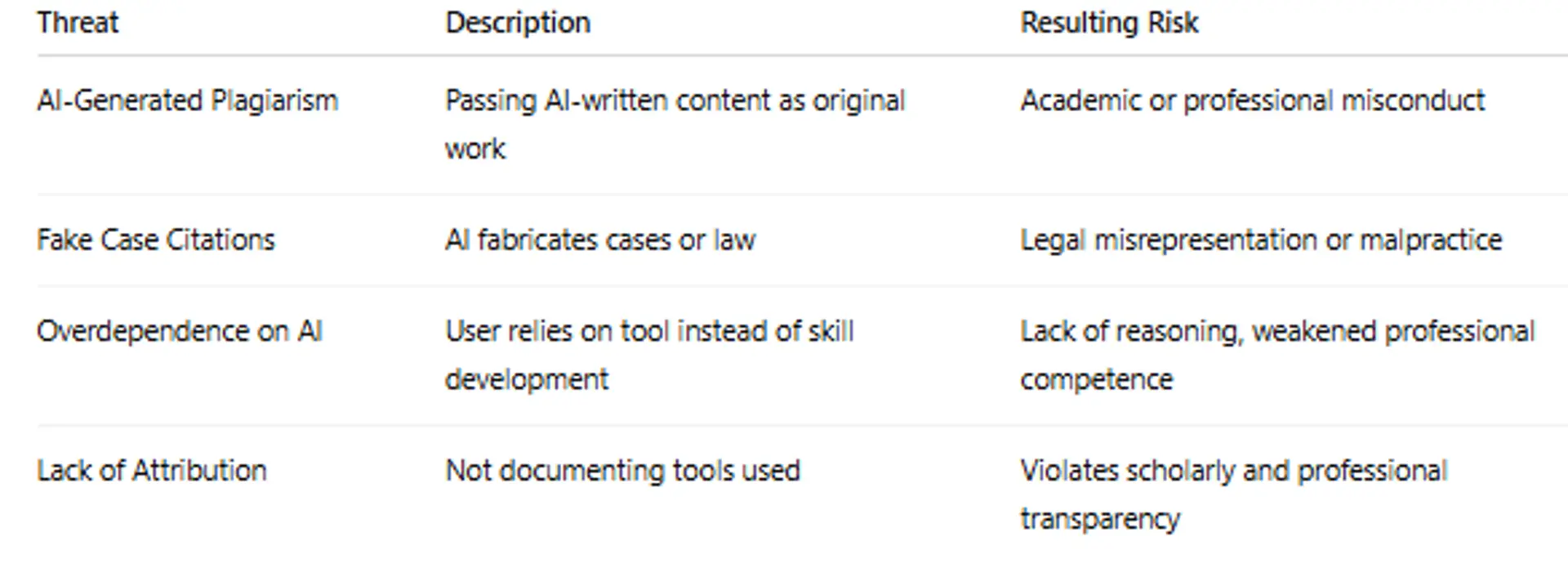

Module 5: Ethics, Confidentiality, and Professional Responsibility Lesson 5.4
Module 5: Ethics, Confidentiality, and Professional Responsibility
Lesson 5.4: Building a Culture of Digital Academic Integrity
Learning Objectives
By the end of this lesson, learners will be able to:
- Define digital academic integrity and explain why it matters in modern legal and academic environments.
- Identify behaviors that strengthen or undermine academic integrity when using AI-generated content.
- Develop practical policies, guidelines, and workflows that promote responsible AI usage.
- Model and encourage a culture of ethical practice within organizations, classrooms, law firms, and professional communities.
As AI tools become widespread, academic and professional environments face increasing challenges related to originality, authorship, and intellectual honesty. While AI can support research, writing, and strategic reasoning, it must be used responsibly. Digital Academic Integrity ensures that AI supports learning and legal reasoning rather than replacing or distorting it.
1.What is Digital Academic Integrity?
Digital Academic Integrity refers to maintaining honesty, transparency, and ethical standards when using digital tools—including AI—to produce work.
Key Components:
- Truthfulness: Representing facts and citations accurately.
- Transparency: Disclosing when and how AI tools were used.
- Authenticity: Ensuring AI assists reasoning rather than replaces it.
- Accountability: Taking full responsibility for the final output.
2.Common Threats to Digital Integrity

3.Strategies to Promote a Culture of Integrity
1.Teach AI as a Tool — Not a Replacement
Encourage students and professionals to use AI to:
- Brainstorm
- Summarize
- Explain legal concepts
- But not to:
- Write final drafts
- Create legal arguments without fact-checking
- Generate fake citations
2.Implement AI Disclosure Statements
Every submission should include:
- Which AI tool was used
- What tasks the AI assisted with
- Confirmation that verification was performed
Example Disclosure:
“ChatGPT was used to summarize background cases and format draft language. All citations were verified manually using LexisNexis.”
3.Require Verification Before Acceptance
Set a policy:
No work containing unverified case law, statutes, or citations will be accepted.
This applies to:
- Legal memos
- Case briefs
- Research assignments
- Academic essays
4.Model Ethical AI Use
Leaders (teachers, lawyers, managers) should demonstrate:
- How to prompt responsibly
- How to verify legal sources
- How to credit AI appropriately
Culture follows example.
5.Create Shared Integrity Contracts
A digital integrity pledge promotes community accountability.
Sample Statement:
“I will use AI to enhance my reasoning, not replace it. I will verify all legal references and take responsibility for all submitted work.”
4.Supplementary Learning Resources
- What Is Academic Integrity in Education? | Safe AI for The Classroom News
- Academic Integrity Redefined in the Age of AI
- What is an AI Acceptable Use Policy (AUP)? | Safe & Responsible AI at Work
lesson 5.4 Quiz: Building a Culture of Digital Academic Integrity
Please complete this quiz to check your understanding of Lesson 5.4.
You must score at least 70% to pass this lesson quiz.
This quiz counts toward your final certification progress.
👉 Click here for Quiz 5.4
Conclusion
Building a culture of digital academic integrity ensures that AI strengthens learning rather than harming it. Integrity is not preserved through software alone—it requires human judgment, accountability, and leadership. When organizations and learning environments create norms of transparency, verification, and ethical usage, AI becomes a powerful tool for improving education and legal practice rather than a shortcut or liability.
Next and Previous Lesson
Next: Module 6: AI in Classroom Management & Engagement
Lessons:
6.1: AI Chatbots for Student Assistance & Q&A
Previous:Lesson 5.3: How to Read and Interpret AI Detection Reports
AI for Educators: Personalized Learning & Content Creation
Related Posts
© 2025 Invastor. All Rights Reserved

User Comments